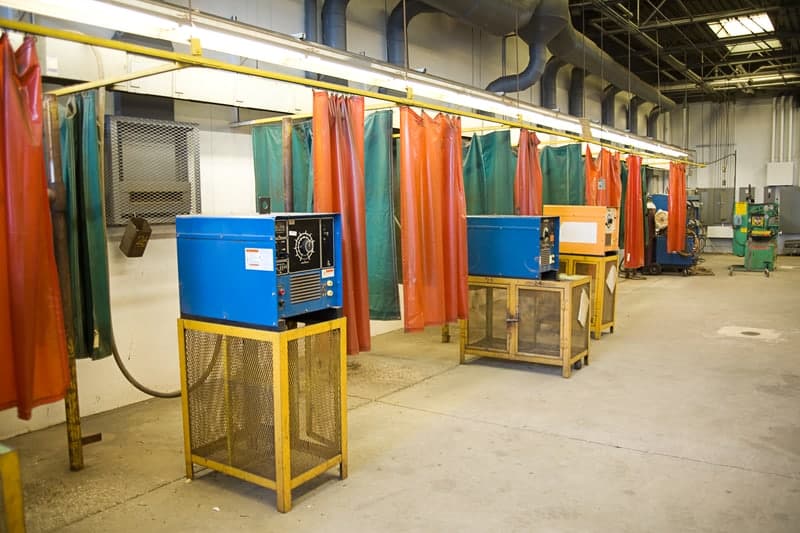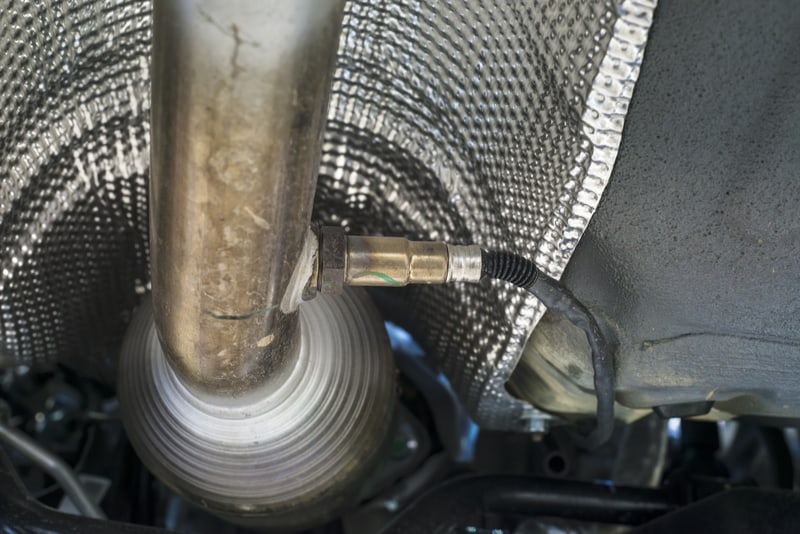“This post contains affiliate links, and I will be compensated if you make a purchase after clicking on my links.”
Choosing a welding school can be one of the biggest decisions you make when you first start on the path to a welding career. Welding school is a big financial investment, and there are lots of options for schools to attend. Several factors can go into your decision beyond which schools are cheapest or most convenient.
Before you pick your welding school, it can be useful to ask yourself some questions to figure out what you’re looking for in your welding education and what you can get out of each institution. Below we’ll go over those questions and figure out how to make the most informed choice when it’s time to choose your perfect welding school.
How Much Can I Afford on Welding School?
The first question you’ll need to ask yourself when deciding on a welding school is how much you can afford to spend on your studies. This will affect whether you’ll be able to study welding at a top-rated welding school out of state or if you’ll need to keep your ambitions in check and look at local options.
When you’re figuring out how much you can afford on welding school, ask yourself the following questions:
- Does the school offer financial aid? Many welding programs offer financial aid such as scholarships and student loans to help prospective students pay for their course of study. Welding schools may require documentation such as a driver’s license or other identification to apply for a loan.
- Does the welding school costs include supplies? Welding supplies are expensive, and they can pose a serious budget-buster if you don’t factor them in on top of your regular tuition costs. Look into what basic welding supplies you’ll need to purchase yourself and which will be supplied to you for class labs. (Source: Universal Technical Institute)
- Does the welding school have a work study program? If you need help paying for your welding program, many dedicated welding schools may offer a work study to help students pay for their education. Some may also offer connections for apprenticeships where students can work and study at the same time.
- Will you need money for housing? Staying at home with your parents or other family members while you’re studying can help you save money, otherwise you’ll need to factor the costs of rent into your budget for welding school.
Welding studies can be expensive, but there are several ways for you to offset some of the costs so that you can go to school even on a shoestring budget.
Figuring out what kind of budget you have to work with before you start looking at welding schools can make your decision much easier by disqualifying any welding schools you can’t reasonably afford. If you can’t afford welding school at first, knowing how much it costs can give you a goal to save towards so you can attend welding school in the future.
Am I Willing to Relocate for Welding School?
While you might want to go to the best welding school in America, you’ll need to consider carefully whether you’re willing to relocate to go to welding school. Unlike other specialized majors, welding is a common technical skill. If you don’t want top tier education, you should access a welding program at many community and technical colleges locally.
But are there benefits to relocating for a welding school? Here are a few reasons why you might want to consider relocating for a top-quality welding program:
- More job opportunities: Good welding schools are usually located in geographic regions where welding is a prized technical skill with lots of job openings. You might have an easier time finding a good welding position when you graduate if you graduate from a school that is already close to a bunch of welding positions.
- Top-quality education: If you want the best of the best in welding education, you’ll have to seek out some of the top welding programs in the country. The quality of welding experience you get at a welding-dedicated technical school is much higher than the level of experience you’d get at a local community college program.
Even though there are advantages to relocating for welding school, there are some drawbacks too. A welding school worth relocating for will usually be much more expensive than one you can attend locally unless you’re already lucky enough to live somewhere with a top-tier welding program. You’ll also have to account for the costs of relocation too, such as moving costs.
Another issue with relocating for welding school is that it often requires the loss of a support network. You may need to move away from family, friends, and other emotional support to study welding out of state. This can take a serious toll on personal relationships that may need to go long-distance for the length of your welding study.
Is the Welding School Acredited By the AWS?
Not all welding jobs require a welding certificate, but the best-paying jobs usually do. This means if you want a welding job with the best working environment and benefits, you’ll need to pursue your welding certification. There are also certifications for specialized welding, such as underwater welding. (Source: Florida Technical College)
The least education that most welding positions require is a high school diploma. (Source: Integrative Staffing Group) But earning a welding certification from the American Welding Society (AWS) can qualify you for a much broader group of job openings, increasing your chances of quick employment after graduation.
Just because you don’t have your welding certification yet doesn’t mean you can’t get a welding job. Many welding positions will allow you to start as an apprentice while you get your welding certificate in school. Some employers may even reimburse you for some of your educational costs in exchange for a work contract.
What Percentage of the School’s Graduates Are Hired?
When you’re asking a welding school’s representatives about the benefits of the school, be sure to ask them about what percentage of the school’s graduates are hired within six to twelve months of graduation. While employment rate is also dependent on economic factors like general employment rates and hiring conditions, it can
There are a few ways that welding schools help increase their odds of turning out employed graduates:
- Corporate networking: Many welding schools are well-networked with established welding companies and industrial corporations. In exchange for fresh labor at a relatively low salary, these companies recruit directly through the school system. This recruitment increases the chance of graduates getting an employment opportunity.
- Work study programs: Advanced welding students are sometimes given the chance to participate in work study programs or apprenticeships while they’re still in school. This allows them to transition seamlessly into an employment position when they graduate.
- Job placement coaching: Along with presenting opportunities for students to sell themselves to prospective employers through headhunters and networked companies, many welding schools also offer job placement coaching to help students learn how to craft their resume and present themselves well in their job hunting.
The whole point of going to welding school is to increase your chances of getting a good job when you graduate, so checking out how well the welding school you’ve chosen translates their educational program into a job position is a good idea before you commit to them.
Which Welding Schools Have the Best Reputation?
If you have a relatively large budget to go to welding school, you might want to cast your net a bit wider and search the best schools available for welding rather than the school nearest to you.
So what makes a welding school’s reputation? What makes a welding school the best welding school you could attend? Here are just a few of the traits you should look for when looking into the reputation of welding schools:
- Combo welding classes: Combo welding classes involve classes that teach you how to perform welding of rebar and other structural components on a construction site. Combo welding involves many skills such as reading schematics and preparing any necessary welding materials. (Source: Zip Recruiter)
- Major welding concepts: Reputable welding schools will cover every major type of welding you could run into, from stick welding to MIG and TIG welding. A welding school education should leave you ready to leap into pretty much any welding job except those that require extenuating skills such as underwater welding.
- Hands-on training: The most reputable welding programs will give you tons of hands-on experience during the course of your welding education. Because it is a highly technical skill, welding is best learned through direct experience. This allows welders to have the skills necessary to start welding as soon as they graduate.
You might be tempted to sign up for the first welding program you run across locally out of convenience. However, with this option you might not get as much bang for your buck investment-wise as you would if you sought out a welding program with a better reputation.
Will Your Employer Reimburse You for Welding School?
In some cases, you might not even have to wait until you’ve been to welding school before you get a welding job. Many welding positions pay for on-the-job training, and some welding jobs may partially reimburse employees for any welding education they pursue while they’re employed by the company.
This benefits both the welder and their employer, since it gives the employer access to a better-trained welder. It also makes the welder suitable for promotions, raises, and other positive job opportunities.
Does the Welding School Offer Placement Programs?
As part of their services to outgoing graduates, some welding schools offer interview coaching and other placement programs. Interview coaching is the process of guiding graduates in the skills they need to ace a job interview. These placement program services can also incorporate other job-hunting skills.
If the idea of looking for a welding job after welding school gives you anxiety, choosing a welding school that has robust employment placement services like interview coaching can make you much more comfortable with making the transition from school to the welding shop. Having a high chance at finding a good welding job takes a lot of the weight off your shoulders.
Here are a few other services you might get to take advantage of if you choose a welding school with employment placement services like interview coaching:
- Career/job fairs: If you go to a welding school that’s dedicated to welding only, chances are the school has welding-specific recruiters that will come to job fairs and other school events where graduates can network. However, technical colleges that cover a wide variety of technical skills also offer career networking opportunities at job fairs.
- Individual career counselling: Individual counselling is a great way for welding students to address particular concerns they have with the employment process, such as interview anxiety or difficulty choosing between multiple job positions.
- Resume preparation: While welding positions are technical jobs that depend on experience, many welding students don’t have much professional experience to fall back on. Welding school placement programs can teach you how to present the skills you’ve learned in your welding education in a way that makes you tempting to employers.
When it comes to welding education, the end goal is always going to be a good job placement when you graduate. Choosing a welding school that puts a strong focus on alumni support and job placement services can help keep you from worrying whether your investment in a welding certification is worth the payoff.
Choose Your Welding School Carefully
There are hundreds of welding schools across North America and even more community colleges and technical colleges that offer a welding program. Be sure to look into any welding school you’re considering carefully and make sure you’ve worked through all of your available options before you register for classes.
If you take the time to ask questions and research welding schools before you make your final choice, you’re sure to find a welding school that is perfect for you.
Sources
5 Colleges With the Best Job Placement Programs (campusexplorer.com)
What Comes after Welding School? Job Outcomes and More… (ftccollege.edu)
5 Tips for a Welding Job Interview – Tulsa Welding School (tws.edu)
Welding School Guide (wcwelding.com)
How to Choose a Vocational School That Suits Your Needs | InterCoast Colleges
13 Questions to Answer When Choosing a Trade School (uti.edu)
Tips For Choosing a Welding School – Class One Welding
List of Top 6 Welding Schools in America – weldingmania.com
List of Best Welding Schools in USA 2021 | NEIT
17 Best Welding Schools & Colleges in US (Updated in 2021) – WaterWelders




